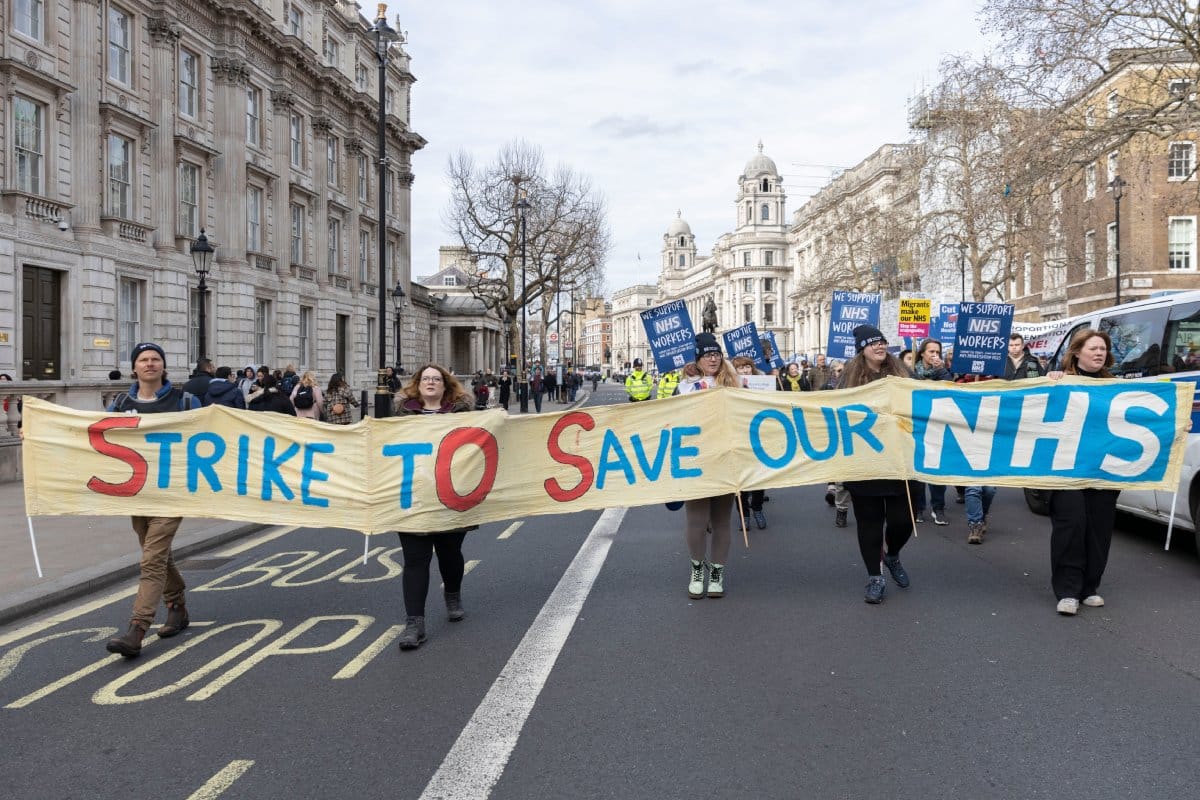Cancer patients in the UK could be at “critical” risk of death if the NHS staff and government do not strike a pay deal soon. Experts predict a “devastating” effect on patients, especially those with less survivable cancers.
Healthcare Crisis Could Have Dire Consequences
The United Kingdom’s healthcare system is currently facing a dire crisis, with thousands of cancer patients at risk of early death due to an ongoing pay dispute between the government and junior doctors. This bitter conflict has led to a series of strikes, severely impacting cancer care and treatment.
The prolonged nature of the strikes, now in their thirteenth month, poses a significant threat to patients’ survival chances, particularly those diagnosed with less survivable cancers. The situation has prompted health officials and cancer leaders to emphasize the urgent need for a resolution to prevent further harm.
The Current State of Affairs
The ongoing dispute has resulted in the longest and most impactful strike on the National Health Service (NHS) since its establishment in 1948. With no signs of a resolution in sight, the stalemate is jeopardizing the well-being of patients across the country.
Junior doctors, constituting half of the medical workforce, have become a focal point in the negotiations, adding pressure on key figures such as Prime Minister Rishi Sunak, Health Secretary Victoria Atkins, and the British Medical Association’s junior doctors committee.
Impact on Cancer Patients
Cancer leaders are sounding the alarm, expressing increasing frustration at the devastating consequences of the strikes on cancer care. Tens of thousands of cancer appointments, treatments, and operations have been cancelled, causing a ripple effect on the timely delivery of crucial medical interventions.
Patients diagnosed with less survivable cancers, including lung, liver, brain, oesophageal, pancreatic, and stomach cancers, are particularly vulnerable to the disruptions caused by the strikes.
Data and Statistics
Freedom of information requests have revealed alarming statistics, indicating that approximately 36,000 cancer appointments were postponed by September of the previous year due to strikes. A second set of data highlighted that thousands of cancer patients experienced multiple cancellations of crucial hospital appointments amid widespread NHS disruption.
Dr. Ian Walker, Cancer Research UK’s executive director of policy, stressed the urgency of resolving the pay dispute, “We remain concerned that the continued industrial action will cause further disruption for cancer patients,” he said, “It is vital that we see a speedy resolution to current industrial action, but alongside this, government must deliver additional investment in NHS staff and diagnostic equipment, coupled with reform.”
Less Survivable Cancers Taskforce’s Plea
The Less Survivable Cancers Taskforce, representing patients with less survivable cancers, is calling for immediate resolution.
Chair Anna Jewell stressed the devastating impact of cancelled consultations, procedures, and treatments on patients facing less survivable cancers. With over 90,000 people diagnosed with such cancers annually, Jewell highlighted the urgency of addressing the reduced capacity of the health service, which could severely impact life expectancy for those in need of urgent diagnoses and treatments.
“We are urging ministers and doctors to get round the table and resolve this strike as soon as possible,” said Jewell, “Having consultations, procedures and treatments cancelled is frustrating and stressful for any patients but for those with a less survivable cancer, the impact can be devastating.”
Jewell continued, “These rapidly advancing cancers are currently difficult or impossible to treat at later stages, so delays to diagnosis and treatments can severely limit options for patients who then face even worse survival prospects”. Jewell also revealed how the situation is “critical” for those with less survivable cancers if they don’t get their treatment on time.
Cancer Charities Push For a Solution
Prof Pat Price, chair of Radiotherapy UK and co-founder of the #CatchUpWithCancer campaign, emphasized the undesirable impact of the continuing strike action on cancer patients. “I urge everyone to gather round a table to resolve these,” Price said. Price pointed out that even before the strikes, the UK faced a “cancer crisis” due to “years of underinvestment” in essential personnel and equipment. The recent abandonment of a dedicated cancer plan, despite international evidence supporting its effectiveness, further exacerbated the situation.
The ongoing pay dispute between the UK government and junior doctors has reached a critical point, with the health of thousands of cancer patients hanging in the balance. The strikes, now in their thirteenth month, have led to widespread disruptions in cancer care and treatment. Urgent talks are necessary to find a resolution and prevent further harm to patients, especially those diagnosed with less survivable cancers.
More Articles Like This…
Broken Britain: 12 Reasons Behind the UK’s Decline
Say the Unsayable: 10 Occasions When Farage Spoke His Mind About Britain
The post No Deal NHS Strikes: Experts Predict Critical Risk to Cancer Patients first appeared on Edge Media.
Featured Image Credit: Shutterstock / Zeynep Demir Aslim.
Oscar Davies, an expert in US and UK politics and sports, is renowned for his sharp and engaging writing style, appealing to a broad spectrum of readers.

